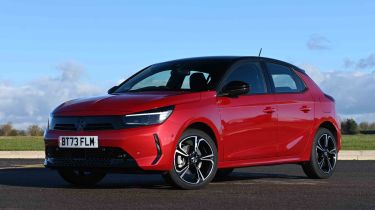Vauxhall Corsa - Engines, performance and drive
Strong engines and low weight help the Vauxhall Corsa deliver sprightly performance, but some rivals ride a little more smoothly

Under Stellantis ownership, Vauxhall has utilised the group’s CMP small car platform to build the latest Corsa. In contrast to the underpinnings of the previous Corsa that dated back to the early 2000s, the latest architecture is bang up to date, being both stiffer and lighter overall thanks to lighter seats, an aluminium bonnet, and some weight-reduction on its engine range. All these weight-saving measures benefit the way the Corsa accelerates, brakes, and handles, as well as reducing how much fuel it uses.
Around corners, it feels more agile and responsive than before, and its grip level is strong. Sadly, the numb steering lets it down a little, meaning it doesn’t feel as sharp as a SEAT Ibiza. The steering is at least very light, making the car easy to manoeuvre into a tight car park space.
The ride is indeed firmer than the previous Corsa, but it’s by no means uncomfortable at low speeds over speed bumps and sunken drain covers. It has a tendency to feel a touch bouncy at higher speeds, meaning it doesn’t feel as settled on long motorway runs as rivals like the Hyundai i20, Renault Clio, or the Volkswagen Polo.
Used - available now

2021 Vauxhall
Corsa
39,060 milesManualPetrol1.2L
Cash £10,500
2022 Vauxhall
Corsa
13,457 milesManualPetrol1.2L
Cash £12,287
2023 Vauxhall
Corsa
38,407 milesManualPetrol1.2L
Cash £9,563
2021 Vauxhall
Corsa
29,506 milesManualPetrol1.2L
Cash £9,506The non-hybrid petrol options use a 1.2-litre three-cylinder that can be had without a turbo in base 74bhp form with a five-speed manual, or you can go for our preferred 99bhp version, which has a turbo and either a six-speed manual or optional eight-speed auto. The 99bhp engine makes the most sense to most buyers because of its excellent mid-range pulling power, meaning you don’t need to thrash it to keep up with traffic. The most potent 128bhp version is overkill in comparison and can only be had with an eight-speed automatic, which gets caught out by its stop/start system and makes for jerky progress around town.
You can also opt for a mild-hybrid 1.2-litre, which comes in 99bhp or 134bhp forms. We were surprised at how much time it could spend at low speeds just utilising electric power, while the handover from electric to engine power is virtually seamless. The electric motor it has is only small, so once underway, there’s little difference in performance between a hybrid model and its automatic counterpart. There is a regenerative braking function that helps to recharge the battery, but like the all-electric version, it isn’t strong enough for one-pedal driving.
But if you want to drive under electric power all the time, then you’ll need the Corsa Electric. You’ve a choice of the entry-level 50kWh version using a 134bhp electric motor, or a 51kWh version with a more powerful 154bhp electric motor. Both do an admirable job of keeping up with traffic, and you can read more about the Vauxhall Corsa Electric in our dedicated review.
Models higher up in the range – both combustion and electric - are available with a selectable driving mode. By switching to Sport mode, petrol models get an artificial engine note piped into the cabin, plus extra weighing to the steering. Prodding the Sport button in the Corsa Electric allows the driver full access power; otherwise, you’ll find it throttled back slightly to improve range and efficiency further.
Refinement is a Corsa plus point. The cabin is more hushed than ever, and so are its engines. Turbocharged or not, the 1.2 petrol is a sweet unit. Power delivery is smooth and predictable; these units only make their presence felt audibly under hard acceleration. Most three-cylinder units are a little thrummy at higher revs, and this one is no exception – but the cabin and the controls are well insulated against vibrations. Naturally, the electric models are quieter still, offering the most refined Corsa driving experience.
0-62mph acceleration and top speed
The entry-level 74bhp 1.2-litre petrol takes 13.2 seconds to complete the 0-62mph dash, while its top speed is 108mph. Our preferred 99bhp, turbocharged 1.2 slashes this acceleration time down to 9.9 seconds and increases the top speed to 120mph. Pairing this engine with the eight-speed auto gearbox means the 0-62mph takes a little longer at 10.8 seconds, while it has a 119mph top speed. The 99bhp 1.2 Hybrid model is marginally swifter, taking 10.7 seconds, but has a slower top speed of 116mph.
Splash out for the 128bhp 1.2-litre turbo, and it’ll come with an automatic as standard. The 0-62mph time is 8.7 seconds and 130mph flat out, while the 134bhp Hybrid trims this to 8.6 seconds and ups the top speed to 133mph.
The 74bhp 1.2 doesn’t feel out of its depth in town, but you’ll need to work it hard to keep up with traffic on faster roads. That’s why the 99bhp turbo version is the one we recommend because it gives you better out-of-town performance without costing as much as the 128bhp version, and it’s a little quicker than the slightly pricier 94bhp 1.0 TSI Volkswagen Polo. The hybrid might be worthwhile if you have to have an automatic anyway, and you drive enough that the additional fuel economy makes its higher purchase price worthwhile.
We’ve covered the Corsa Electric in a separate review, but to sum up, the entry-level electric version with 134bhp takes 8.9 seconds from 0 to 62mph, while the 154bhp version takes just 8.2 seconds. Both top out at 93mph, although that’s more than enough for our roads.








